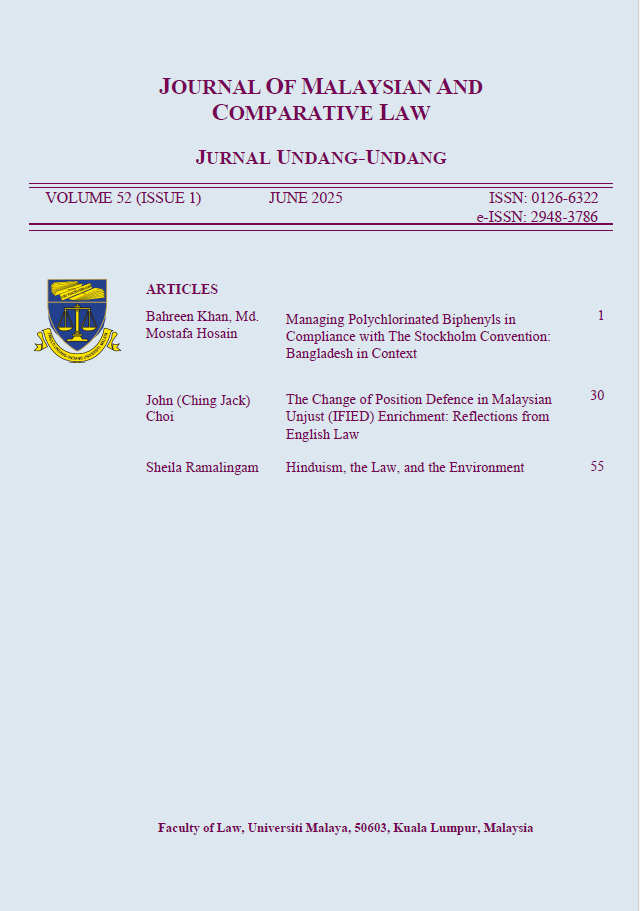NAVIGATION
Submission Guidelines
Editorial Information
Peer Review
Ethics and Malpractice Statements
Publication Schedule
Abstracting and Indexing
Artificial Intelligence Policy
Publication Fees
Contact Us


PAPER TEMPLATE






SUPPORTED SOCIETIES
The Journal of Malaysian and Comparative Law (JMCL) [ISSN 0126-6322/e-ISSN 2948-3786] is a refereed journal published annually by the Faculty of Law of the Universiti Malaya which began publication in 1974. It publishes original unpublished works comprising articles, comments, case notes and reviews on the whole spectrum of legal topics and issues. Currently, it publishes twice a year (June & December).
Commencing with the June 2024 edition, the Journal has transitioned fully to online publication, discontinued its print edition, and adopted an online-first approach, under which accepted peer reviewed papers are published immediately upon approval of the Managing Editor.

This issue of the JMCL features three articles addressing contemporary legal and interdisciplinary concerns. The first article, “Managing Polychlorinated Biphenyls in Compliance with the Stockholm Convention: Bangladesh in Context,” by Bahreen Khan and Md. Mostafa Hosain, examines the complex economic, social, and environmental challenges posed using hazardous substances (HS), chemicals, and hazardous waste (HW). Drawing on scientific evidence from authoritative sources, the authors reaffirm that the production and excessive use of such substances adversely affect ecosystems, human health, wildlife, and the natural environment. Due to their persistence and toxicity, some chemicals are classified as persistent organic pollutants (POPs), among which polychlorinated biphenyls (PCBs) are particularly significant because of their widespread industrial use, especially in electrical equipment. The article situates these concerns within the framework of the Stockholm Convention, adopted in 2001, and evaluates Bangladesh’s regulatory initiatives as a Party to the Convention. While noting that the import of PCBs has been banned, the authors find that stronger measures are required to meet the Convention’s phase-out deadlines. They emphasise the need to update the National Implementation Plan, strengthen the identification and disposal of PCB waste, particularly in the power sector, and reinforce legal controls to prevent unsafe dumping and environmental release. The article offers recommendations with potential relevance for regulatory reform in Bangladesh and guidance for other developing countries confronting similar challenges.
The second article, “The Change of Position Defence in Malaysian Unjust(ified) Enrichment: Reflections from English Law,” by John Choi, critically analyses the development of unjust or unjustified enrichment in Malaysian law. Although both English and Malaysian legal systems recognise unjust enrichment alongside the defence of change of position, the author observes that the Malaysian apex court decision introducing this cause of action failed to clarify the scope or rationale of the defence, leaving a significant doctrinal gap. The article evaluates the normative place of the change of position defence against four distinctive features of Malaysia’s unjust(ified) enrichment and restitution framework: the coexistence of a statutory restitutionary regime under the Contracts Act 1950 with a nascent common law action; the apparent adoption of a ‘value surviving’ rather than a ‘value received’ test of enrichment; the reception of the civilian-inspired ‘absence of basis’ approach; and the emergence of an under-theorised inquiry into ‘unconscionability’. The author argues that the interaction of these elements exposes unresolved tensions and poses challenges to the doctrinal coherence of unjust enrichment in Malaysia.
The third article, “Hinduism, the Law and the Environment,” by Sheila Ramalingam, explores the relationship between Hinduism, law, and environmental governance. Recognising Hinduism as one of the world’s oldest and most widely practised religions, the author highlights its internally diverse body of beliefs, practices, and philosophical traditions. Through a qualitative analysis of selected religious texts alongside contemporary data on global environmental issues, the article critically assesses claims regarding the relevance of Hindu environmental ethics to modern environmental challenges. While identifying points of convergence between Hindu ethical thought and present-day environmental concerns, the article also questions the limits and practical applicability of translating ancient religious concepts into contemporary legal and policy frameworks. The contribution encourages a more nuanced evaluation of the role religious environmental ethics may play in addressing complex modern ecological crises.
Associate Prof. Dr. Mohammad Ershadul Karim
Managing Editor
NAVIGATION
Submission Guidelines
Editorial Information
Peer Review
Ethics and Malpractice Statements
Publication Schedule
Abstracting and Indexing
Artificial Intelligence Policy
Publication Fees
Contact Us








SUPPORTED SOCIETIES
Office:
Journal of Malaysian and Comparative Law
Faculty of Law, Universiti Malaya
50603 Kuala Lumpur, Malaysia
Phone: +03-7967-6503/6504
Email: jmcl@um.edu.my
